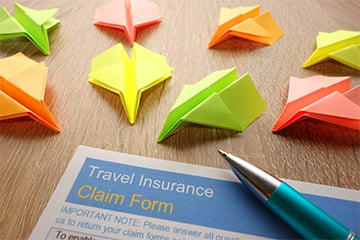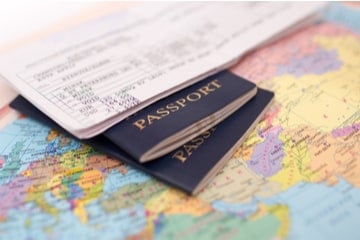-
Medical treatment costs: The standard of healthcare in India can be poor, and private healthcare is costly. Travel insurance can make sure you don't lose out on thousands of pounds to pay for medical treatment.
-
Cancellation cover: If your flights or other connecting travel gets cancelled, you can get compensation.
-
Theft, damage or loss: Pickpocketing can be a problem in tourist areas like Delhi, so having a policy that covers your baggage and other belongings if they're stolen is a good idea.
-
Emergency repatriation: If you need to get home in an emergency, your travel insurance can cover the cost of flights home.
-
Travel disruption: This will cover you if your travel gets delayed or disrupted. This could be because of adverse weather or strikes.
What does travel insurance for India cover?
What our travel insurance expert says
What type of travel insurance do I need for India?
How much is travel insurance for India?
Travel insurance costs for India:
Single-trip
£10.931
Multi-trip
£27.052
Backpacker
£96.273
Travel insurance for India could cost you as little as £10.54.
Just bear in mind that several factors go into determining what you pay, like your age, any health conditions you have and any additional extras you tack on to your policy.
So what you pay for your cover might differ.
1The cheapest price for single-trip travel insurance. Based on 1 adult aged 30 with no pre-existing medical conditions, travelling in India for 1 week. Confused.com data, January 2025.
2The cheapest price for worldwide annual travel insurance (excluding the US, Canada, Mexico and the Caribbean). Based on 1 adult aged 30 with no pre-existing medical conditions. Confused.com data, January 2025.
3The cheapest price for worldwide backpacker travel insurance (excluding the US, Canada, Mexico and the Caribbean). Based on 1 adult aged 30 with no pre-existing medical conditions, travelling for 3 months. Confused.com data, January 2025.
What extras can I add on to my travel insurance?
Depending on what your trip will involve, you might want to think about adding optional extras to your policy. Extras are a good thing to consider if you're going away for a particular reason, like on business or to take part in certain adventure activities.
Do I need a Visa for India?
Yes, if you’re a UK resident you’ll need a visa to visit India, unless you have an overseas citizens of India card.
You can apply for a visa at the Bureau of Immigration.
If you're of Pakistani descent, you might have to wait longer for your visa to be processed. It's a good idea to apply well enough in advance so it's sorted in time for your trip.
Other entry requirements:
To travel to India you’ll also need six months on your passport.
You'll also need two blank pages in your passport so there's room for visas or stamps.
You can't add any pages to your passport, so if you haven't got enough pages you'll need to renew the passport.
What's transport like in India?
Rail
India has an extensive rail network, with a rich history. You can get to most of the country by train, but coach class can be uncomfortably full, without air con and might not have toilets. If possible, you might want to opt for first-class.
Buses
Like trains, buses in India are extensive but can be extremely busy. It's unlikely that buses will offer the option of first-class like trains.
Taxis
GOV.UK warns that some British tourists have been scammed by unofficial taxi drivers who offer cheap transport. Travellers who have accepted these offers have reported being threatened with violence when they've refused to pay.
Always use official taxi ranks to avoid being scammed. Pre-paid taxi services are available from inside all airport terminal buildings and many hotels offer transfers. Ride-hailing services like Uber and Ola are also widely available in India.
Driving
You can drive on a UK license while you're in India, but you’ll need to get an international driving permit.
You may also need car hire excess insurance if you're going to be renting a car.
It's good to be aware that driving standards are lower in India, and road accidents are one of the leading causes of death in the country. Make sure to always exercise extreme caution and do not expect other drivers to obey traffic laws.
Another important thing to note is that cows are sacred in India and can often bring traffic to a standstill. If you hit a cow with your car, you might get a very negative reaction from people local to the area. If this happens, you should call the police and wait for help.
Air travel
Air travel is of good standard and is generally the best way to get around India because of how vast it is.
What else do travellers need to know about India?
Alcohol
Crime
LGBT+ rights
Smoking
Explore other destinations
Need more help with travel insurance for India?
Are there any travel warnings in place for India?
Currently, there are some travel warnings in place for India. You should always check the FCDO advice before you go away, as it can quickly change.
The FCDO are currently warning against travel to areas of unrest.
This includes:
- The India-Pakistan border area
- Jammu and Kashmir
- Manipur
What vaccinations do I need for India?
To gain entry into India, you won't legally need to have had any travel vaccinations. However, Fit for Travel encourages UK residents to get these vaccinations:
- Diphtheria
- Hepatitis A
- Tetanus
- Typhoid
You may also want to consider:
- Hepatitis B
- Rabies
It's worth getting these if you're going to an area where these are prevalent or entering situations where infection is likely.
It's always worth speaking to your GP for advice on vaccinations for travelling before you leave.
Learn more about travel insurance
Our service is free and compares a wide range of trusted household names. Confused.com is an intermediary and receives commission from theidol.com if you decide to buy through our website which is based on a percentage of the total annual premium. We pride ourselves on impartiality and independence – therefore we don't promote any one insurance provider over another.








